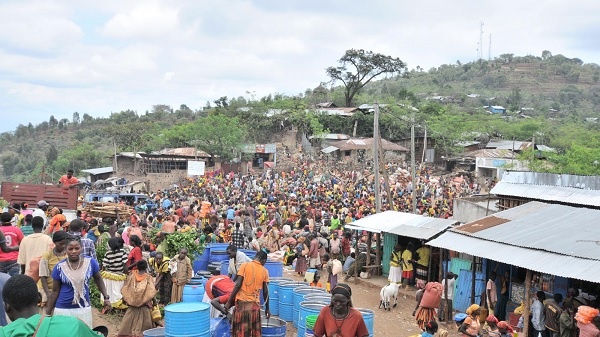
Since the beginning of the cholera outbreak in September 2019 in Ethiopia, a total of 2,549 suspected cases were reported from three regions of the country.
The cholera outbreak in Ethiopia
The cholera outbreak in Ethiopia, which initially started on 24 September 2019 in Hudet woreda (district) in Somali Region, continues, although the situation has continuously been improving.
In week 7 (week ending 16 February 2020), a total of 65 suspected cholera cases were reported compared to 167 cases reported in week 6. The new cases reported during the week (week 7) came from 17 woredas in seven zones of the three regions. The number of cases reported weekly has been on a downward trend since week 2 (week ending 11 January 2020) when 570 cases were reported.
Since the beginning of the cholera outbreak on 24 September 2019, a cumulative total of 2,549 suspected cases were reported from seven zones in three regions, as of 16 February 2020. The regions most affected are Southern Nations Nationalities Peoples (SNNP) and Somali where 94% of suspected cases have been reported. The most affected people are between the ages of 15 and 44 years, accounting for 52% of all cases. The outbreak has affected more males than females with a ratio of 1.1:1. The main propagating factors of the outbreak include insufficient potable water, poor sanitary and hygiene facilities amongst populations in many of the affected communities.
Public Health Actions
The Ethiopian Public Health Institute (EPHI), in collaboration with WHO and other health partners, are responding to the outbreak in the affected woredas. Technical experts in water, sanitation and hygiene (WASH); risk communication; surveillance; health information management; case investigation and logistics are deployed to support the response.
The Federal Ministry of Health, with support from partners, conducted the first round of oral cholera vaccination campaign in Afar, Oromia, Somali and SNNP regions, reaching 581,973 of the 616,643 targeted persons, giving a coverage of 94.4%.
EPHI, in partnership with technical support from WHO, UNICEF, John Hopkins University and others, is developing a cholera control and elimination plan.
The Federal Ministry of Health, with support of WHO, continues to provide cholera investigation and cholera treatment kits to the affected woredas. The Federal Ministry of Health, together with WHO and other partners, continues to provide technical support to the response through deployment of experts in surveillance, case investigation, and health information management.
Risk communication and community engagement activities on preventive and control of cholera are ongoing in the affected Woredas.
Water, sanitation and hygiene activities, including water quality surveillance and monitoring, chlorination of water sources and provision of water purification tablets to the affected communities have been extensively provided to ensure consumption of safe water by the affected communities.
Situation interpretation
The cholera outbreak in Ethiopia continues to improve, with the number of new cases gradually going down. Outbreak control activities led by EPHI are ongoing in affected communities focusing on enhanced surveillance, case management, WASH and community engagement. The national authorities and partners should ensure targeted interventions based on sound epidemiologic analysis.
Source: WHO Health Emergencies Programme
